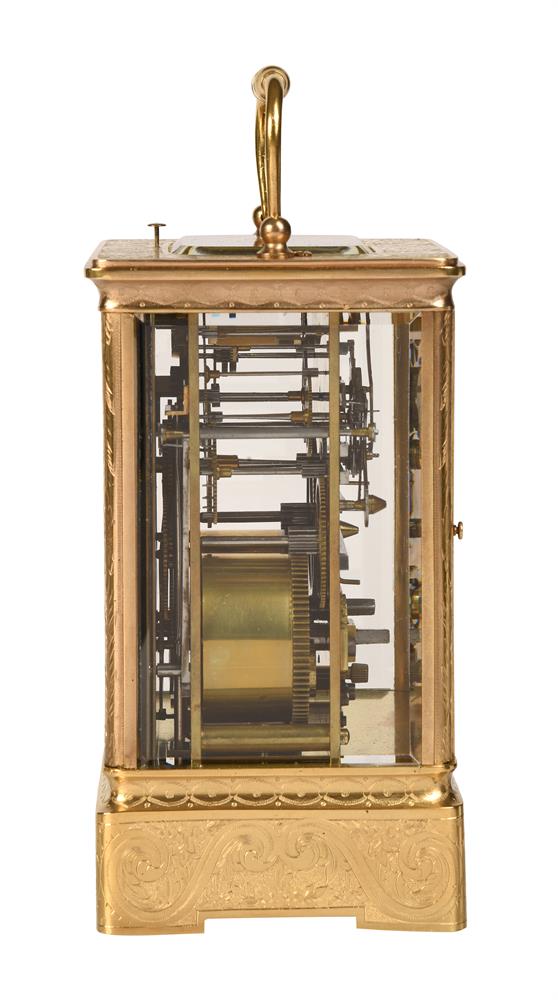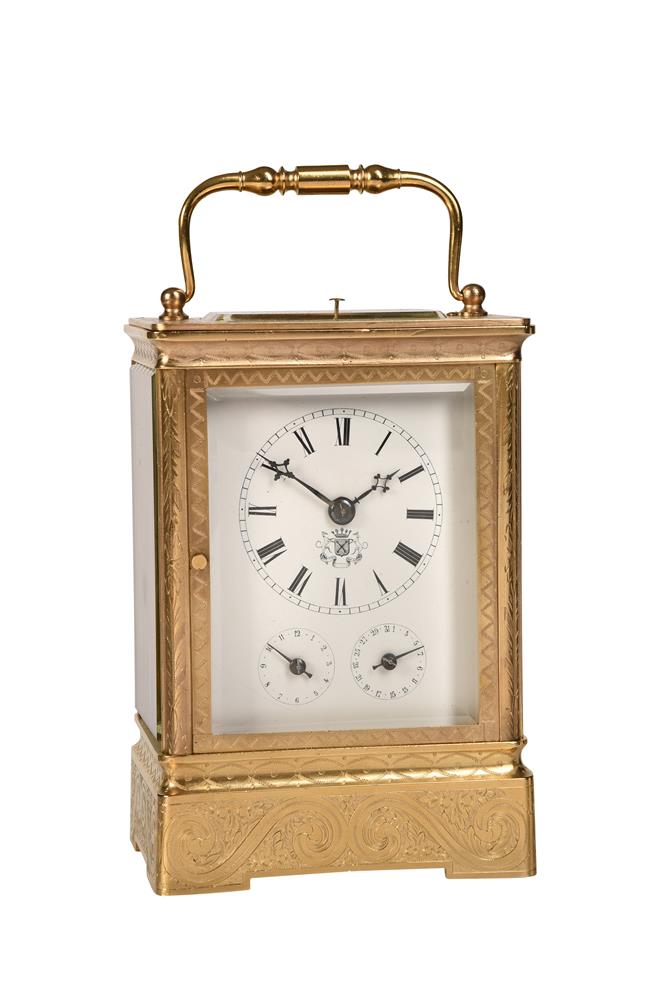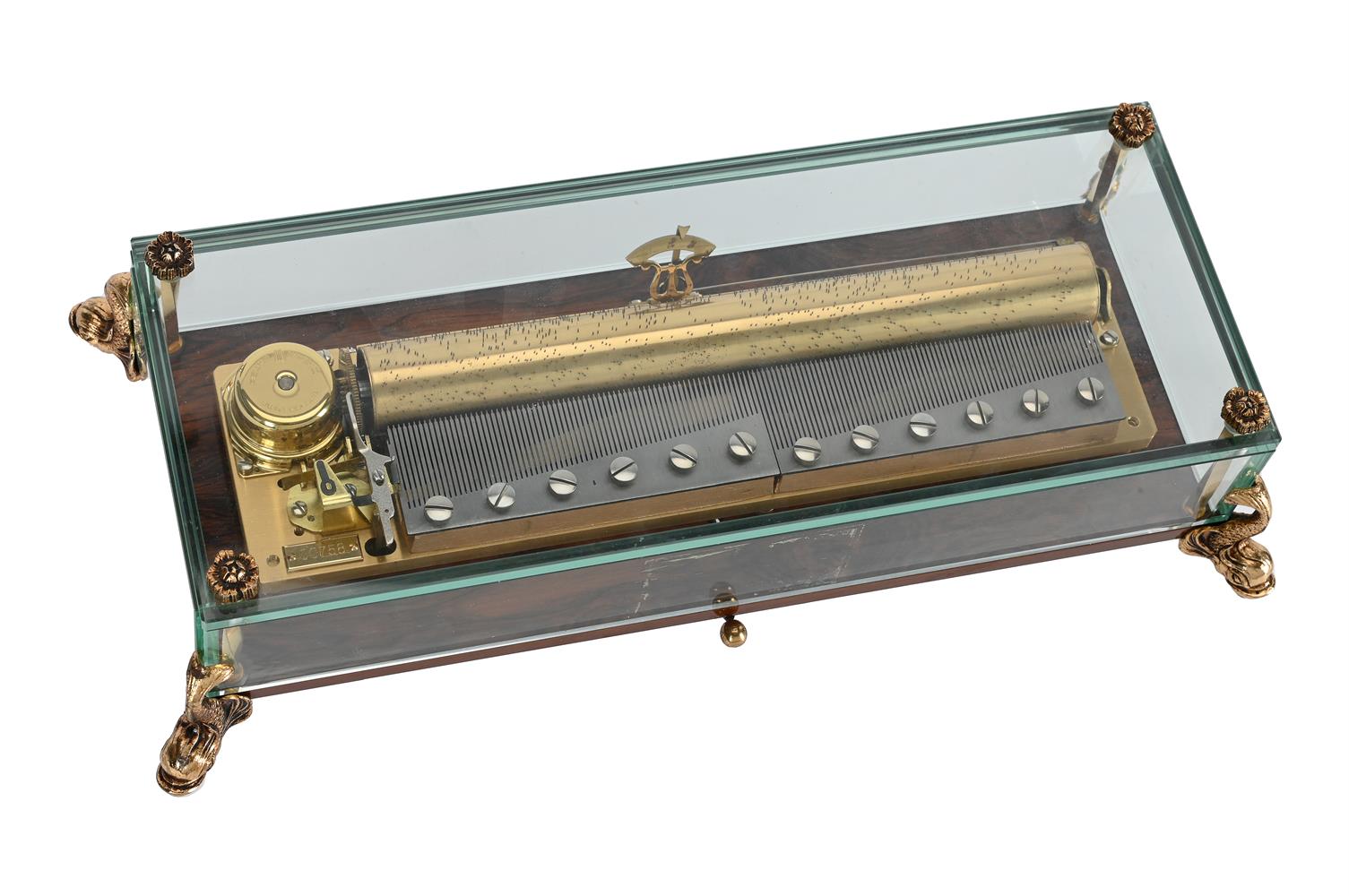A FINE SWISS GILT BRASS MINUTE-REPEATING MINIATURE CARRIAGE TIMEPIECE RETAILED BY J.W. BENSON LIMITED, LONDON, CIRCA 1900 The rectangular frosted silvered eight-day two-in-one single going barrel movement with platform lever escapement regulated by sprung bimetallic balance, the repeat train sounding the hour on the larger of two gongs before ting-tang quarters and finally the minutes passed after the last quarter on the smaller gong, the backplate with visible winding clicks and take-off work for driving the repeat mechanism, with circular trademark RTP monogram to left hand margin opposing stamped BREV (Swiss cross) DER and number 14007 to right hand margin, the rectangular cream enamel Roman numeral dial with gilt spade hands over retailer's signature J.W. BENSON LTD, LUDGATE HILL, LONDON, and SWISS MADE, the frosted gilt anglaise variant bevel-glazed bowfronted case of Mignonette No. 2 size with hinged looped carrying handle over rectangular top glass and curved-front caddy-moulded cornice inset with a reeded band, with fluted Corinthian columns to corners and glazed rear door, on caddy moulded skirt base, the underside stamped 963; in original gilt-tooled green leather travelling/display case with winding key. The timepiece 9cm (3.5ins) high with handle down, 5.5cm (2.125ins) wide, 5cm (2ins) deep. Provenance: Private collection, East Midlands. The firm of J.W. Benson has its roots in the partnership between brothers James William and Samuel Suckley Benson which traded as watchmakers, goldsmiths and silversmiths in Cornhill, London from 1847 until 1855. James William Benson continued the business alone and opened a premises at 33 Ludgate Hill which quickly expanded to absorb number 34 as well. By the 1860's Benson was advertising his large and richly stocked shop with adjoining workshop specialising in the manufacture of clocks and watches as well as their repair. J.W. Benson exhibited at numerous international exhibitions including London 1862, Paris 1867 and subsequently at the 1885 'Invention Exhibition' where the firm unveiled its 'Patent Dust and Damp Excluding Band for Watches'. In 1872 J.W. Benson opened a shop on Bond Street; he died in 1878 however the business continued to expand under the management of his sons, Alfred and Arthur, with another shop on Ludgate Hill and steam powered factory in La Belle Sauvage yard opening in 1890. In 1879 the firm of J.W. Benson was awarded a Royal Warrant by Queen Victoria and in 1889 they acquired the business of the celebrated silversmiths and goldsmiths Hunt and Roskell. The business continued well into the 20th century however their factory was lost in a bombing raid during WWII; the Bond Street store continued trading until it was taken over by Mappin and Webb during the 1980's. Miniature carriage clocks are called Mignonnettes or 'little darlings' and come in three graded sizes with No. 1 being the smallest. Miniature minute-repeating carriage timepieces were developed by Swiss makers during the last decade of the 19th century, who utilised their skills as watchmakers to produce high-quality movements such as that used in the present lot. Condition Report: The movement is in fine working condition having been recently fully serviced. The dial appears free from visible damage or wear. The case is in fine condition with good strong gilding exhibiting minimal wear or discolouration. The front glass has slight chipping to the inside of three of the corners. The protective case has some wear/discolouration to the silk lining and the strap handle has a break; otherwise faults limited to slight wear to the leather most notably around the front clasp Timepiece is complete with winding key. Condition Report Disclaimer
A FINE SWISS GILT BRASS MINUTE-REPEATING MINIATURE CARRIAGE TIMEPIECE RETAILED BY J.W. BENSON LIMITED, LONDON, CIRCA 1900 The rectangular frosted silvered eight-day two-in-one single going barrel movement with platform lever escapement regulated by sprung bimetallic balance, the repeat train sounding the hour on the larger of two gongs before ting-tang quarters and finally the minutes passed after the last quarter on the smaller gong, the backplate with visible winding clicks and take-off work for driving the repeat mechanism, with circular trademark RTP monogram to left hand margin opposing stamped BREV (Swiss cross) DER and number 14007 to right hand margin, the rectangular cream enamel Roman numeral dial with gilt spade hands over retailer's signature J.W. BENSON LTD, LUDGATE HILL, LONDON, and SWISS MADE, the frosted gilt anglaise variant bevel-glazed bowfronted case of Mignonette No. 2 size with hinged looped carrying handle over rectangular top glass and curved-front caddy-moulded cornice inset with a reeded band, with fluted Corinthian columns to corners and glazed rear door, on caddy moulded skirt base, the underside stamped 963; in original gilt-tooled green leather travelling/display case with winding key. The timepiece 9cm (3.5ins) high with handle down, 5.5cm (2.125ins) wide, 5cm (2ins) deep. Provenance: Private collection, East Midlands. The firm of J.W. Benson has its roots in the partnership between brothers James William and Samuel Suckley Benson which traded as watchmakers, goldsmiths and silversmiths in Cornhill, London from 1847 until 1855. James William Benson continued the business alone and opened a premises at 33 Ludgate Hill which quickly expanded to absorb number 34 as well. By the 1860's Benson was advertising his large and richly stocked shop with adjoining workshop specialising in the manufacture of clocks and watches as well as their repair. J.W. Benson exhibited at numerous international exhibitions including London 1862, Paris 1867 and subsequently at the 1885 'Invention Exhibition' where the firm unveiled its 'Patent Dust and Damp Excluding Band for Watches'. In 1872 J.W. Benson opened a shop on Bond Street; he died in 1878 however the business continued to expand under the management of his sons, Alfred and Arthur, with another shop on Ludgate Hill and steam powered factory in La Belle Sauvage yard opening in 1890. In 1879 the firm of J.W. Benson was awarded a Royal Warrant by Queen Victoria and in 1889 they acquired the business of the celebrated silversmiths and goldsmiths Hunt and Roskell. The business continued well into the 20th century however their factory was lost in a bombing raid during WWII; the Bond Street store continued trading until it was taken over by Mappin and Webb during the 1980's. Miniature carriage clocks are called Mignonnettes or 'little darlings' and come in three graded sizes with No. 1 being the smallest. Miniature minute-repeating carriage timepieces were developed by Swiss makers during the last decade of the 19th century, who utilised their skills as watchmakers to produce high-quality movements such as that used in the present lot. Condition Report: The movement is in fine working condition having been recently fully serviced. The dial appears free from visible damage or wear. The case is in fine condition with good strong gilding exhibiting minimal wear or discolouration. The front glass has slight chipping to the inside of three of the corners. The protective case has some wear/discolouration to the silk lining and the strap handle has a break; otherwise faults limited to slight wear to the leather most notably around the front clasp Timepiece is complete with winding key. Condition Report Disclaimer















Testen Sie LotSearch und seine Premium-Features 7 Tage - ohne Kosten!
Lassen Sie sich automatisch über neue Objekte in kommenden Auktionen benachrichtigen.
Suchauftrag anlegen